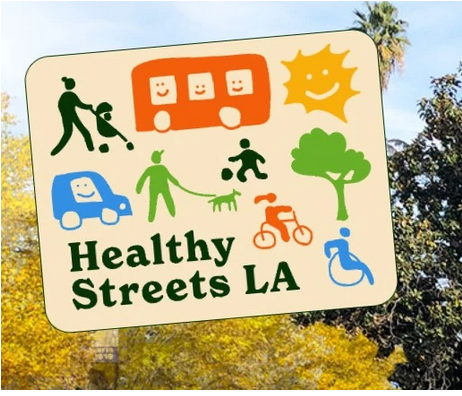If backers obtain the required signatures, L.A. City voters will have their say this November on a ballot measure mandating implementation of the city's Mobility Plan.
The Healthy Streets L.A. initiative is the brainchild of a coalition of community organizations, so far including: Streets For All, L.A. County Bicycle Coalition, Climate Resolve, West Valley People's Alliance, Sunrise Movement L.A., Streets Are For Everyone, MoveLA, and CalBike.
Based on similar mandates in Cambridge, Providence, and Seattle, Healthy Streets L.A. would require the city to implement its own approved Mobility Plan whenever the city repaves or otherwise works on a street. Cambridge Mayor Marc McGovern credited his city's ordinance with taking ambiguity off the table, so people know that bike lanes are being implemented, and the conversation shifts to how to do them most effectively.
L.A. City approved its Mobility Plan 2035 back in 2015. The plan designated extensive networks of transit-priority bus lane streets, pedestrian-priority areas, and protected bikeways. The plan also ratified Vision Zero as L.A. City policy - committing the city to end traffic deaths.
At the time, the plan was heralded by the L.A. Times as "a sweeping new framework" that would get L.A. to "shed its traditional automobile-centric approach and evolve into a modern, multimodal city." Bloomberg praised the plan for "advancing the prospect of a future L.A. where the car is but one of several choices for getting around... [building on] an increasingly viable mass transit system... where bike commuting is not some far-fetched fantasy."
Then the city basically put the plan on a shelf to gather dust. Mayor Eric Garcetti failed to task his transportation department with implementing approved multimodal facilities that might marginally delay drivers. The mayor acquiesced to a reactionary Westside backlash, removing bikeways. Numerous City Councilmembers - including Gil Cedillo, Paul Koretz, Paul Krekorian, Mitch O’Farrell, Curren Price, and David Ryu - blocked approved and planned street improvements. City departments complied with resistant councilmembers, leaving multi-modal features out of public works projects.
According to Streets for All founder Michael Schneider, L.A. has only implemented 95 miles out of 3,137 miles of Mobility Plan features - about three percent in seven years.
Schneider is encouraging concerned Angelenos to volunteer for Health Streets L.A. - helping collect signatures, either in public places, or among networks of friends and neighbors - to make sure the proposed measure gets on the November ballot. To volunteer, sign up at the Healthy Streets L.A. website.






